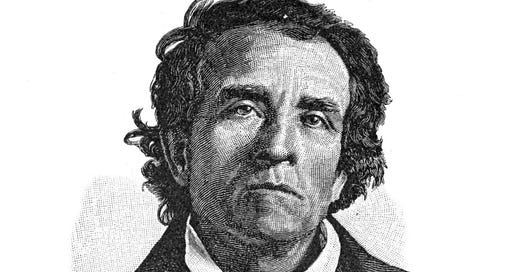A Forgotten Abolitionist
By the mid-1830s, abolitionism was spreading across northern states like wildfire, largely because of Theodore Dwight Weld.
In 1834, a 30-year-old seminary student named Theodore Dwight Weld led what is arguably the most successful student rebellion in U.S. history.
It took place near Cincinnati at Lane Theological Seminary, where Weld had enrolled the previous year after dedicating his life to a single cause: the abolition of slavery.
“Abolition immediate universal is my desire and prayer to God,” he had written in an 1833 letter. “I hardly know how to contain myself.”
Weld led a group of students—known as the Lane Rebels—who demanded a free exchange of ideas on the issue. And their demands were met initially, historian Jack Kelly wrote in his 2017 his book Heaven’s Ditch:
“In February 1834, against [its] better judgment, [Lane Seminary] allowed [its] students to hold a series of debates about two questions: Should slavery be immediately abolished? Should Christians support colonization? Weld, an experienced and persuasive talker, took the lead. … For eighteen days, regular classes were suspended while the students and guest speakers discussed the questions.”
Then something happened. The university’s board of directors, led by university president Lyman Beecher (father, ironically, of Harriet Beecher Stowe), shut down debate. In protest, about 80 percent of the students abandoned the school, arguing that the pursuit of Truth should prevail, and if not “better the mob demolish every building.”
Most of the students went to nearby Oberlin College, a religious school founded a year earlier by a Presbyterian minister, but Weld was not one of them. He abandoned his studies to help found the American Anti-Slavery Society (though he did help organize Oberlin as the first college to admit African Americans and females).
In 1839 Weld published American Slavery As It Is, the tract that would inspire Harriet Beecher Stowe’s seminal work Uncle Tom’s Cabin.
By the mid 1830s abolitionism was spreading across northern states like wildfire, largely because of Weld, whom historian Paul Johnson called “the most sophisticated and effective of the abolitionist campaigners.”
What’s most striking to me is how different the 1830s student revolt was to those we see on campuses today. Weld’s revolt was more than a cause; it was a rebellion of ideas. The students simply were seeking freedom to communicate a straightforward concept—that slavery is wrong–and they used reason and history to present their case. When debate was shut down, they committed the ultimate form of protest: they left.
Compare that to today’s campus protests, which more often than not involve students trying to stop others from freely exchanging ideas. When today’s students do seek redress to a specific issue, spectacle, not reason, is usually the method of choice.





Whatever is of the Left is couched as "resistance" alla Frantz Fanon endorsed by Jean Paul Sartre.
Via this moralising even October 7th in every instance of atrocity is considered "legitimate".
Gramsci's "long march through the institutions" led to the '68 in Europe and the campus protests in the USA against the Vietnam War.
The "Make Love Not War" flower children lost their peaceful ways and were sucked into the Frantz Fanon "resistance" as they grew older sympathising with the violence of "resistance".
From a libertarian point of view, there can be no instance of UN-accountability for any form of collateral damage, never mind the deliberate targetting of non combatants as in October 7th, rape and torture included.
Us libertarians are morally obliged to compensate for any collateral damage even if unintentional.
(International law for warfare disallows the October 7 violence but from a libertarian point of view such law is still inadequate permitting collateral damage relative to a proportionate use of force e.g. when the enemy is using civilians as human shields).
The militancy of students of the Left however manifests wholly within the "morality" of "resistance" hence the "Summer of Love 2020" and the pro Hamas violence on the campuses ... and now the torching of Tesla vehicles and the Tesla retail shops.